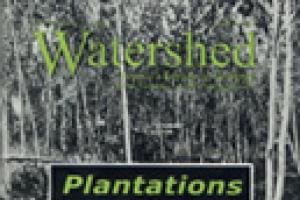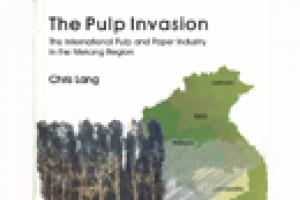Proponents of industrial tree plantations argue that plantations are "reforestation", increasing the area of forest, providing jobs for local people, or reducing pressure on natural forests. The reality in Cambodia exposes these arguments for propaganda.
Cambodia's Prime Minister, Hun Sen, has handed out vast areas of land concessions, many to his business acquaintances and friends. While Cambodia's 2001 Land Law limits the size of land concessions to 10,000 hectares, many of the concessions are far in excess of this area.
Cambodia
Bulletin articles
21 April 2005
In 2004, the task manager for the World Bank’s Forest Concession Management and Control Pilot Project (FCMCPP) described Cambodia’s forest concession system as "inadequate on paper, dysfunctional in reality". He might have added that all the concessionaires had committed legal or contractual breaches and extensively looted what the World Bank termed "Cambodia’s most developmentally important natural resource". Such considerations have not, however, prevented the World Bank from investing five years in supporting this same flawed management system and its piratical operators.
Bulletin articles
26 January 2005
Corruption has been identified as a major obstacle to real change in the forest sector in Cambodia. Not only the government but also the international donors have refused to confront the issue. The costs of weak forest sector governance, in terms of lost revenues, destruction of rural livelihoods and environmental damage, continue to mount, with the result that Cambodia remains completely dependent on foreign aid.
Bulletin articles
26 December 2004
In Cambodia, more than 80% of the population lives in rural areas and 36% lives in extreme poverty, earning less than 50 US cents per day. Though many villagers make a living out of the forest products, deforestation is part of the national policy and economy, showing that local and state authorities pay lip-service to the needs of the poor.
Bulletin articles
29 July 2004
The March-June edition of the magazine "Watershed" focuses on the issue of tree plantations in Cambodia, Laos, Thailand and Vietnam as part of the broader picture of the spread of industrial tree plantations in the South.
This edition of Watershed is the result of a collaborative effort between a large number of individuals and organizations --mostly from within but also from outside the Mekong region-- concerned over the social and environmental impacts resulting from large-scale tree monocultures.
Other information
23 June 2004
by Andrew Cock.
In "Plantations are not Forests. Commercial Tree Plantations in the Mekong Region".Vol. 9 No. 3 March - June 2004. Published by Towards Ecological Recovery and Regional Alliance (TERRA)
Publications
9 December 2002
This report was produced in 2000-2001 for the World Rainforest Movement, looking at the current state of the pulp and paper industry in the Mekong Region: Thailand, Laos, Cambodia and Vietnam. The research covers the extent of plantations and their social and environmental impacts in the region, the role of the various institutions in supporting the expansion of industrial plantations, and the patterns of local resistance to ecological damage and loss of livelihood.
Bulletin articles
3 December 2002
Of the more than 10 million Cambodians currently living in rural areas, over 8.5 million depend on natural resources to support their livelihoods. Although most rely on rice farming, they have just one crop of rice per year which they complement with a range of forest products that also play a critical role in supporting livelihoods.
Bulletin articles
7 November 2002
In late July NGOs wrote to the Ministry of Agriculture to request that Forest Concession Management Plans and Environmental and Social Impact Assessments (ESIAs), submitted by concessionaires to the Department of Forestry and Wildlife, be released for public comment. Three and half months later, an edited version of these documents is to be released, to allow for just over two weeks of public comment. This, the World Bank has decided, is sufficient a period of time to justify the release of the final tranche of their Structural Adjustment Credit (SAC).
Bulletin articles
12 July 2002
Built at a cost of $1 billion on the Se San River in Vietnam, the Yali Falls dam has caused devastating impacts on downstream communities in Cambodia (see WRM Bulletin 42). At least 32 people have drowned in flash floods caused by sudden releases of water from the dam and villagers have lost livestock, crops and fishing equipment. Poor water quality in the river has led to skin rashes and stomach problems for downstream communities. Fisheries in the Se San River have been dramatically reduced.
Bulletin articles
14 June 2002
While not related to the pulp and paper industry, rubber plantations and oil palm plantations have similar impacts on local communities to fast-growing tree plantations. Rubber and oil palm plantations also involve using large areas of land, often land which is crucial to local people's livelihoods.
Bulletin articles
14 May 2002
Over the last decade the area of fast-growing tree plantations in the Mekong region has expanded dramatically. Villagers throughout the region have seen their forests, fallows and grazing lands replaced with eucalyptus, acacia and pine monocultures. A new World Rainforest Movement report, "The Pulp Invasion: The international pulp and paper industry in the Mekong Region", written by Chris Lang, gives an overview of the industry, profiles the actors involved and documents the resistance to the spread of plantations.


